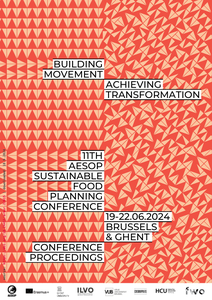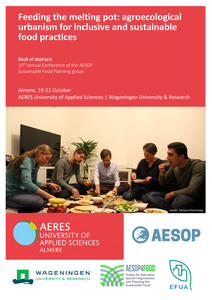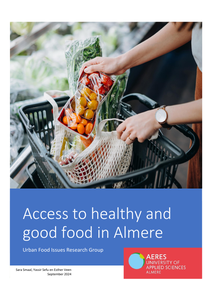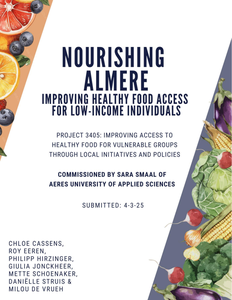This study theorizes on the sociomateriality of food in authority-building processes of partial organizations by exploring alternative food networks (AFNs). Through the construction of arenas for food provisioning, AFNs represent grassroots collectives that deliberately differentiate their practices from mainstream forms of food provisioning. Based on a sequential mixed-methods analysis of 24 AFNs, where an inductive chronological analysis is followed by a qualitative comparative analysis (QCA), we found that the entanglements between participants’ food provisioning practices and food itself shape how authority emerges in AFNs. Food generates biological, physiological and social struggles for AFN participants who, in turn, respond by embracing or avoiding them. As an outcome, most AFNs tend to bureaucratize over time according to four identified patterns while a few idiosyncratically build a more shared basis of authority. We conclude that the sociomateriality of food plays an important yet indirect role in understanding why and how food provisioning arenas re-organize and forge their forms of authority over time. Pascucci, S., Dentoni, D., Clements, J., Poldner, K., & Gartner, W. B. (2021). Forging Forms of Authority through the Sociomateriality of Food in Partial Organizations. Organization Studies, 42(2), 301-326. https://doi.org/10.1177/0170840620980232
DOCUMENT

Citizens living in food poverty can easily get caught up in a vicious cycle. Socio-economically disadvantaged people often rely on food assistance and are more likely to suffer from diseases caused by unhealthy diets, such as diabetes. They may also experience isolation and lack social networks, as they do not have the financial means to participate in social life. Moreover, this group is often overlooked in decision-making processes regarding healthy and sustainable food environments. To create equitable food environments in urban areas, it is crucial to incorporate the everyday challenges and needs of socioeconomically disadvantaged people. In our collaborative research, we explore the needs of socioeconomically disadvantaged people regarding a healthy and sustainable diet in Switzerland and the Netherlands. The aim is also to develop, in a participatory way, ideas on how to create more socially just and inclusive food environments.Keywords: food poverty, food environments, social participation, participatory action research
DOCUMENT

The transition towards a sustainable and healthy food system is one of the major sustainability challenges of today, next to the energy transition and the transition from a linear to circular economy. This paper provides a timely and evidence-based contribution to better understand the complex processes of institutional change and transformative social-ecological innovation that takes place in the food transition, through a case study of an open innovation and food transition network in The Netherlands, the South-Holland Food Family (Zuid-Hollandse Voedselfamilie). This network is supported by the provincial government and many partners, with the ambition to realize more sustainable agricultural and food chains, offering healthy, sustainable and affordable food for everyone in the Province of South-Holland in five to ten years from now. This ambition cannot be achieved through optimising the current food system. A transition is needed – a fundamental change of the food system’s structure, culture and practice. The Province has adopted a transition approach in its 2016 Innovation Agenda for Sustainable Agriculture. This paper provides an institutional analysis of how the transition approach has been established and developed in practice. Our main research question is what interventions and actions have shaped the transition approach and how does the dynamic interplay between actors and institutional structures influence institutional change, by analysing a series of closely related action situations and their context, looking at 'structure' and 'agency', and at the output-outcomes-impact of these action situations. For this purpose, we use the Transformative Social-Ecological Innovation (TSEI)-framework to study the dynamic interplay between actors and institutional structures influencing institutional change. The example of TSEI-framework application in this paper shows when and how local agents change the institutional context itself, which provides relevant insights on institutional work and the mutually constitutive nature of structure and agency. Above institutional analysis also shows the pivotal role of a number of actors, such as network facilitators and provincial minister, and their capability and skills to combine formal and informal institutional environments and logics and mobilize resources, thereby legitimizing and supporting the change effort. The results are indicative of the importance of institutional structures as both facilitating (i.e., the province’s policies) and limiting (e.g. land ownership) transition dynamics.
DOCUMENT

More and more people worldwide live in urban areas, and these areas face many problems, of which a sustainable food provision is one. In this paper we aim to show that a transition towards more sustainable, regionally organized food systems strongly contributes to green, livable cities. The article describes a case study in the Dutch region of Arnhem–Nijmegen. Partners of a network on sustainable food in this region were interviewed on how they expect the food system to develop, and in design studies possible futures are explored. Both the interviews and the designs give support to the idea that indeed sustainable food systems can be developed to contribute to green livable cities. They show that the quality and meaning of existing green areas can be raised; new areas can be added to a public green system, and connections with green surroundings are enforced. They also show that inhabitants or consumers can be stimulated to become so called food citizens, highlighting that the relation of food systems and livable cities is a very close one.
DOCUMENT

This book contains the abstracts to the sessions presented at the AESOP Sustainable Food Planning conference in 2022. The conference was made up of four tracks: social inclusion; urban agriculture; urban planning, design and development; food governance.
DOCUMENT

This report delves into food insecurity in Almere, focusing on how residents with limited financial means access and consume (healthy) food. The study employed an action research approach, engaging directly with affected individuals and stakeholders to understand their challenges and co-develop solutions. The primary aim was to empower participants by amplifying their voices and providing actionable insights into addressing food insecurity in the community. To achieve this aim we conducted workshops, in-depth interviews and a study using WhatsApp.
DOCUMENT

This report, commissioned by Aeres University of Applied Sciences Almere, outlines how local food initiatives and other community support systems can help to enhance access to healthy food for socio-economically vulnerable groups in Almere. Through literature research, interviews with stakeholders, and a survey among the target group, the main accessibility barriers in accessing healthy food were identified. The results show that the availability of healthy food for socio-economically disadvantaged groups is not just influenced by financial constraints, but also by spatial, social, and knowledge aspects. The report provides concrete recommendations for meaningful change, such as better collaboration between actors, awareness raising, and spatial interventions in the food environment. These results can be used by policymakers, local initiatives, and other stakeholders do develop a more sustainable and equitable food strategy for Almere, where healthy food is accessible to everyone.Keywords: healthy food; Socio-economically vulnerable groups; Accessibility barriers; Recommendations for meaningful change; Food environment theory
DOCUMENT

De transitie van het onderwijs in de foodsector in de Rotterdamse regio
DOCUMENT

How do we increase biodiversity in the Netherlands? By working together! What can food forests and restaurants mean for each other? This report focuses on the question: “What is the potential of collaborations between food forests and restaurants in the Netherlands?”Interviews revealed that successful partnerships are based on direct supplier relationships, internal motivation and niche products that create a unique selling point.
DOCUMENT

Food and the city has never been a more urgent theme than today, and The European Union’s priority to commit to innovation in this field will certainly enhance its economic and external strength and improve its competitive position in the world of food and life sciences. Europea Netherlands held a seminar on this topic in May 2016, during the Dutch EU presidency.To be part of this international endeavour, the Netherlands need to strengthen the digital market, support innovation in the internal market, boost domestic policy reforms, and embed their knowledge and skills in a European society that challenges itself and continues to innovate. The Netherlands is a global player in the agro, food and horticultural sector and a major player in the export market of agricultural products. This sector is one of its main economic pillars. New knowledge is being developed as we speak, which is also an export product in high demand, providing sizeable employment. This is only possible because the sector is innovative and remains up-to-date. The peri-urban areas in the Netherlands (both urban and rural areas) are characterized by high population density. This necessitates thinking about manufacturing, food, logistics and water management(circular economy). Land-based education and life sciences in the Netherlands may appear to be specific, yet it is broad too: the primary sectors are included, as well as the manufacturing businesses and services associated with it. Participants learn to work in an innovative sector in a society in transition, bringing together multiple disciplines (cross-overs) and stakeholders. This education is practical and has a strong connection to the industry. During the Europea seminar five professorships, installed by the ministry of Economic Affairs, focused on transitions in the agro and food sector. The five professorships are posted at the Dutch Agricultural Universities of applied sciences, including teacher education for sustainable connected learning and development for professional education and business communities.
DOCUMENT

Food and the city has never been a more urgent theme than today, and The European Union’s priority to commit to innovation in this field will certainly enhance its economic and external strength and improve its competitive position in the world of food and life sciences. Europea Netherlands held a seminar on this topic in May 2016, during the Dutch EU presidency.To be part of this international endeavour, the Netherlands need to strengthen the digital market, support innovation in the internal market, boost domestic policy reforms, and embed their knowledge and skills in a European society that challenges itself and continues to innovate. The Netherlands is a global player in the agro, food and horticultural sector and a major player in the export market of agricultural products. This sector is one of its main economic pillars. New knowledge is being developed as we speak, which is also an export product in high demand, providing sizeable employment. This is only possible because the sector is innovative and remains up-to-date. The peri-urban areas in the Netherlands (both urban and rural areas) are characterized by high population density. This necessitates thinking about manufacturing, food, logistics and water management(circular economy). Land-based education and life sciences in the Netherlands may appear to be specific, yet it is broad too: the primary sectors are included, as well as the manufacturing businesses and services associated with it. Participants learn to work in an innovative sector in a society in transition, bringing together multiple disciplines (cross-overs) and stakeholders. This education is practical and has a strong connection to the industry. During the Europea seminar five professorships, installed by the ministry of Economic Affairs, focused on transitions in the agro and food sector. The five professorships are posted at the Dutch Agricultural Universities of applied sciences, including teacher education for sustainable connected learning and development for professional education and business communities.
DOCUMENT

Food and the city has never been a more urgent theme than today, and The European Union’s priority to commit to innovation in this field will certainly enhance its economic and external strength and improve its competitive position in the world of food and life sciences. Europea Netherlands held a seminar on this topic in May 2016, during the Dutch EU presidency.To be part of this international endeavour, the Netherlands need to strengthen the digital market, support innovation in the internal market, boost domestic policy reforms, and embed their knowledge and skills in a European society that challenges itself and continues to innovate. The Netherlands is a global player in the agro, food and horticultural sector and a major player in the export market of agricultural products. This sector is one of its main economic pillars. New knowledge is being developed as we speak, which is also an export product in high demand, providing sizeable employment. This is only possible because the sector is innovative and remains up-to-date. The peri-urban areas in the Netherlands (both urban and rural areas) are characterized by high population density. This necessitates thinking about manufacturing, food, logistics and water management(circular economy). Land-based education and life sciences in the Netherlands may appear to be specific, yet it is broad too: the primary sectors are included, as well as the manufacturing businesses and services associated with it. Participants learn to work in an innovative sector in a society in transition, bringing together multiple disciplines (cross-overs) and stakeholders. This education is practical and has a strong connection to the industry. During the Europea seminar five professorships, installed by the ministry of Economic Affairs, focused on transitions in the agro and food sector. The five professorships are posted at the Dutch Agricultural Universities of applied sciences, including teacher education for sustainable connected learning and development for professional education and business communities.
DOCUMENT
